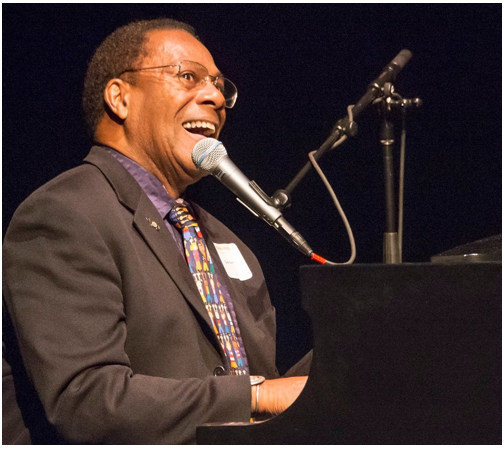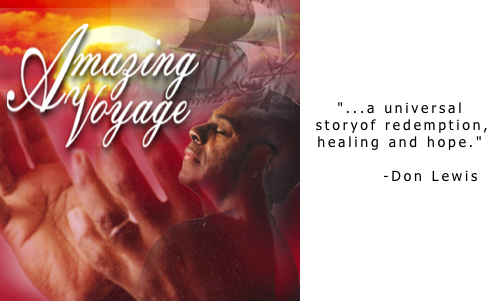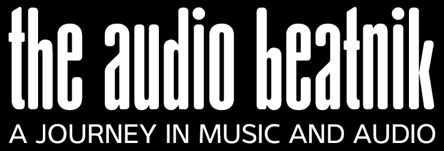
Browsing the Blue Coast Music website, I came across the Amazing Journey album recorded by Don Lewis on the Music In The Air (MITA) label. I wasn’t familiar with Lewis, but I knew immediately from the list of tracks that I would love this album of Gospel music. It’s also a great fit for a review now since February is Black History Month.
I’ll have to say that I was blown away by the emotional impact this album delivers. It took me back to my roots of growing up in Nashville during the Civil Rights era. While most people think of country music when they think of Nashville, it is rightly considered “Music City USA,” and that distinction has always included Gospel music. I grew up appreciating this music genre, and this album delivers some of my favorite songs.
About the Artist
Before I go much further with this review, I should probably mention just a little bit about the artist pictured above. The name Don Lewis may not be familiar to you, but he’s worked with legends like Quincy Jones, Michael Jackson, The Beach Boys and Marvin Hamlisch, just to drop a few names you do recognize.
Lewis is a performer, musician, songwriter and college professor, but he is also an electronics engineer who created the Live Electronic Orchestra (LEO), an innovative cohesion of synthesizers and sound modules, a decade before the first MIDI. This invention wasn’t appreciated by the Musicians’ Union, who protested the technology because they were afraid it would take away jobs from working musicians. So, due to the boycott from the union, Lewis turned to a career as a performer and songwriter in order to support his family.
He added the role of college professor to his impressive resume in the last few years having taught at the UC Berkeley Extension and as a guest lecturer at Stanford and San Jose State. In fact, this album grew out of an 8-week course he developed for the UC Berkeley Extension and named, “Gospel Music: A Passionate Heritage.”
Oh, and by the way, Lewis is practically my neighbor, as he makes his home just down the road from us in Pleasanton, CA, here is the East Bay. You can find out more about his life on Wikipedia and on his web page. There’s also a documentary about his life here.
About the Album

In the liner notes for the album, Lewis writes, “Amazing Voyage is a journey of connecting the dots, fusing together shared experiences from the Africans who captured other tribes and sold them to the slavers as well as the shared experiences of the slavers and the enslaved. “ There are seven songs on the album that lead you through the African experience in America, and three of them are well-known, powerful messages that mark the beginning of slavery, freedom after the Civil War, and the more recent history after the Civil Rights Movement of the 1960s with hope for an end to the struggle one day. Although the other four tracks are also very good, as an African-American preacher would say, “You can’t spend all your time on the mountaintop.”
The album opens with the title track, “Amazing Voyage (Amazing Grace)”. As you can tell from the title, this song incorporates the hymn, “Amazing Grace,” which was written by John Newton in 1748 when the slave ship he captained was caught in a violent storm off of the coast of Ireland. Newton, who went on to become an Anglican minister, cried out to God for mercy in the storm and wrote in the ship’s log, “Only by the Grace of God will we be saved.” Lewis says he found it fascinating that the author of this great hymn was once involved in the slave trade. Yet, this beloved hymn speaks to the triumph of God’s love and His forgiveness despite the sins of mankind.
On the album, this track begins with the sounds of the forest and the laughter of children. Tension builds as you hear shouting and people running to get away from the slave traders. The next movement of the song includes the sounds of whips, ocean waves, people moaning and a violent storm at sea. A hauntingly beautiful solo flute rendition of the hymn provides a bridge from the terror and despair of the journey to hope for a new life. Like the sun breaking through the clouds after a storm, Lewis’ rich baritone voice and a full pipe organ bring this song home with all of the majesty and triumph this hymn delivers.
After catching your breath with tracks two and three, it’s time to soar again with the powerful unofficial anthem of the Civil Rights movement, “We Shall Overcome.” This song, which was written by Charles Albert Tindley, an African American preacher in Philadelphia around 1900, had deep roots in the African American community long before it became known as an anti-war protest song sung by Joan Baez and Pete Seeger or as the song sung by thousands of Civil Rights marchers across the United States.
Here, this song is presented acapella by an African-American choir, and it is simply stunningly beautiful. I don’t have information identifying this choir, but if you have ever been privileged to listen to superb choral music, you will enjoy them.
Another Charles Albert Tindley song, “We Will Understand it Better By and By” brings this album to its conclusion. Just think for a minute what these words from one verse of this song meant to newly freed slaves and have meant over the years to thousands of believers. I know this was one of my mother’s favorite songs, and I remember hearing her sing it often.
By and by, when the morning comes,
when the saints of God are gathered home,
we’ll tell the story how we’ve overcome,
for we’ll understand it better by and by
Trials dark on every hand,
and we cannot understand
all the ways of God would lead us
to that blessed promised land;
but he guides us with his eye,
and we’ll follow till we die,
for we’ll understand it better by and by.
As you can tell from this review, I’ve found an album that I can look forward to listening to time and time again over the years. Thank you, Don Lewis, for this truly inspired musical gem! If you would like to check it out, the album is available in multiple download formats and resolutions from Blue Coast Music.

I also love Gospel music and this is an incredibly moving album, but I wanted to mention how beautifully it is recorded. This is a recording that would impress any audiophile, but it is so much more!
The Old Beatnik